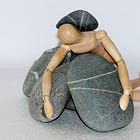This morning, I looked in the mirror and, like most mornings, all I could see were the cracks. Not in the mirror, mind you. No, I see cracks in my skin, as if I have to break and peel away my outer layer to become who I am, who I want to be.
The feeling reminds me of a story about a discarded block of marble.
As the summer of 1501 came to a close, a young sculptor named Michelangelo was given an impossible task. Almost 40 years earlier, in 1464, the committee overseeing the decoration of the Florence cathedral commissioned another sculptor, Agostino di Duccio, to produce a marble statue of a biblical hero. Agostino began with the heroic legs, but quickly backed out of the project.
Antonio Rossellino took over in 1476. He too backed out soon, lamenting the poor quality of the marble.
Decades later, rising star artist Michelangelo had his work cut out for him. The block of discarded marble had been languishing outside and had suffered weather damage. Three years later, the block had become David, the most famous sculpture in the world.
As the saying goes, the greatest sculptors look at a block of marble and see the artwork waiting within, yearning to be set free.
I’m no Michelangelo, and definitely no David, yet I too feel as if I still have to sculpt and remodel myself until I can finally be who I am deep within; an immortal Icarus who wants to be an angel but keeps dropping into the sea over and over, his wings burned to a crisp.
During my lunch break, I scroll through social media feeds and watch a few YouTube videos. I see Davids and Venuses, tales of lucky breaks and successes, Icaruses who flew too close to the sun and succeeded nonetheless. Inside me, something cracks.
The inside is not supposed to crack.
Once upon a time, when life was mostly contained in smaller villages and cities, it was easier to be excellent. In a small pond, even a medium fish can be big; in the ocean, even a whale feels small.
The internet - and especially social media - gave us a window to the whole world. We all inhabit the same virtual village now; a giant village ruled by fickle algorithmic gods.
Let me introduce you to something called availability bias. Or: when setting expectations or evaluating something (or someone, including ourselves), we tend to look at readily available examples.
For example, let’s say I want to get in better shape. I scroll through fitness influencers’ feeds and see people lifting impossible weights while looking like the Platonic ideal of Greek gods and goddesses. Then, I look at myself and feel like a failure - even if I would be in decent shape. My rational self knows those social media pictures/videos are all about Photoshop, airbrushing, fake weights, and using the right filters. Yet, my emotional self doesn’t care about those things; it only cares that I’m not good enough compared to this heavily skewed (and often fake) view of the global village’s inhabitants.
I used a shallow physical example because that’s easy to imagine, but here’s another one close to home for me. I write fiction from time to time, which inevitably means trawling through an ocean of rejections before getting a ‘this isn’t half bad’ in my inbox. Even the odd acceptance finds me once in a blue moon. Meanwhile, on social media, I see people putting out award-winning story after award-winning story, signing book deals, and getting interviews in [insert fancy literary magazine name]. My rational, nuanced, system 2 side of the brain knows that behind every shared success there is a hidden graveyard of dozens of failures, but system 2 takes the backseat while my emotional, trigger-happy system 1 picks up a sledgehammer and goes to town on my already fragile self-image.
Screw sculpting, system 1 is here for destruction.
Evening approaches. I try to write something to take my mind off… everything, really. Writing is one of the few things that works. I lose myself in a story or a rabbit hole and soar on broken wings not yet burned. Before signing off, I read what I’ve written.
Such drivel. Delete. In truth, I’ve probably deleted the best stories and essays I’ve ever written in moments like these. I go to bed and have difficulty falling asleep because I am terrified of waking up broken again.
No one will come to save you; you have to save yourself. It’s an aphorism popular in the tough love school of self-help, meant to empower you. But who said we needed saving?
We need sculpting.
Ay, there’s the rub, my dear Horatios. Sculpting into what? And how? If we continue to sculpt ourselves according to unattainable templates, we’ll keep chipping away until there’s nothing left.
At the same time, we are never complete. We inevitably change, as do our circumstances. Never being, always becoming. Perhaps that’s why everything hurts. Isn’t that what growth is supposed to do? Give you just enough pain to inspire you, to keep you moving forward? Pain is exhausting, though. As the availability bias widens the gap between expectation and reality, it sledgehammers us into despondency and learned helplessness, into self-loathing and despair, and those situations are so hard to escape.
Life does not give you lemons; it gives you a block of crappy marble.
And yet…
And yet even crappy marble can become a David.
I dream of butterflies.
Related thoughts:









This one hits close to home. I've considered myself a pretty good writer - of computer code. The bar for that is low. It works, or it doesn't. Mistakes I make will not cause planes to fall out of the sky, just annoy those who bought the app. When it comes to writing words for people I constantly fall short. Yes, I have deleted most of the first pieces I wrote for Substack. I did change the name of my stack from "Meaningless Drivel" to something less punishing, but I still feel that my free stuff is overpriced.
A heart doesn’t sufficiently express the depth of my love for this post.